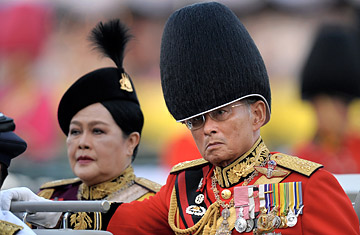
Thailand's King Bhumibol Adulyadej with Queen Sirikit
One day after China announced a major offensive to combat online pornography, Thailand publicized another Internet crackdown, in which local authorities had blocked 2,300 websites. Their alleged offenses? No, not images of skimpily clad women of the kind that can be found in any one of Bangkok's ubiquitous entertainment districts. Instead, these websites were banned because of material that was deemed insulting to the country's beloved royal family.
A constitutional monarchy whose head of state is 81-year-old King Bhumibol Adulyadej, Thailand has stringent lèse-majesté laws on its books. Convictions can result in prison sentences of up to 15 years. On her first day of work last month, newly appointed Information and Communication Minister Ranongruk Suwanchawee told reporters that her main priority would be eradicating antimonarchy websites from Thai cyberspace. Earlier this month, she announced that the ministry was setting up a so-called war room to uncover such sites. Ranongruk says she would like to block 400 more sites but is awaiting court approval to do so. (See pictures of Thai protesters.)
This is not Thailand's first effort to police the Internet for antimonarchy material. In 2007 a previous administration blocked YouTube because of content thought to ridicule the King. The video-sharing website was eventually unblocked after the offending clips had been purged from the system. (In 1999 the Hollywood film Anna and the King, a remake of The King and I, was banned from Thailand by the country's censorship board on the grounds that it mocked the monarchy.)
Several Thais are currently being investigated after lèse-majesté complaints were lodged against them. (A private citizen can lodge such a complaint in Thailand.) Among those accused is a political ally of Thaksin Shinawatra, a self-exiled former Thai Prime Minister who was ousted in a 2006 army coup but who still commands support among the rural populace. Among other allegations, the generals accuse Thaksin of disrespecting the monarchy, a charge he denies.
Foreigners have also run afoul of Thailand's lèse-majesté laws. Recently accused expatriates include an Australian teacher whose novel referenced a fictional wayward prince, and the BBC's Thailand-based correspondent whose online pieces described the role of the monarchy within Thai politics. Both cases have prompted an outcry from international human-rights organizations. "By trying to protect the King's image, the government is actually doing it harm, and in some cases the charge of lèse-majesté has been entirely inappropriate and unjustified," said media watchdog Reporters Without Borders.
But the new administration of Prime Minister Abhisit Vejjajiva seems, if anything, more determined to protect Thailand's monarchy from criticism. Thailand's military appears to share a similar mission. Late last month, army chief Anupong Paochinda reiterated that it was the military's duty to protect the royal institution and ordered his men to report any possible instances of lèse-majesté, according to local news reports. Anupong also urged battalion commanders to comb the Internet for antimonarchy material. With the military now on the case, Thailand's Internet war room just got a lot more ammunition.
